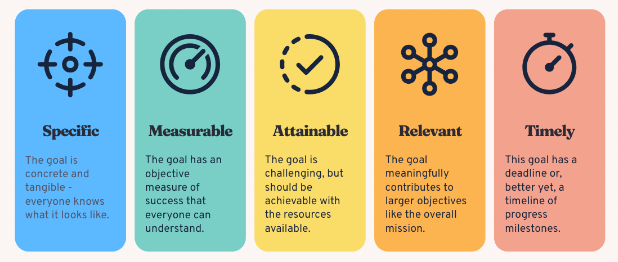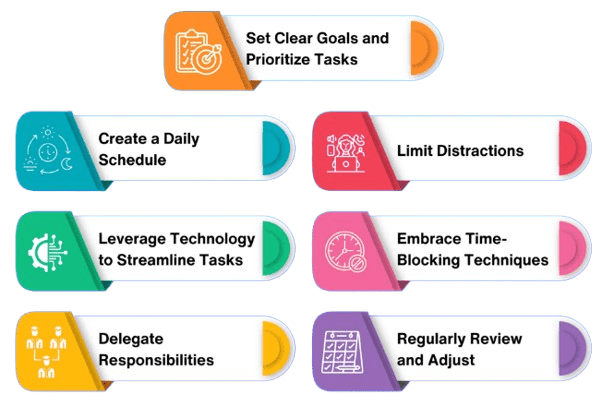
- Introduction to Time Management
- Setting SMART Goals
- Prioritization Techniques
- Time Blocking and Scheduling
- Task Management Tools
- Time Audits and Tracking
- Overcoming Procrastination
- Conclusion
Introduction to Time Management
Time management is the process of organizing and planning how to allocate time effectively across various tasks and activities. It requires making deliberate decisions about prioritizing tasks, avoiding distractions, and maintaining focus to maximize productivity. Effective time management helps individuals achieve their goals more efficiently, minimizing wasted effort and reducing the risk of burnout. In today’s fast-paced world, where both personal and professional demands compete for attention, mastering time management is crucial. It allows individuals to stay on track with deadlines, prevent procrastination, and manage workloads without feeling overwhelmed, skills that are reinforced through Data Science Training. By developing strong time management skills, individuals can not only improve their work output but also enhance the quality of their performance. Moreover, it creates room for personal activities and self-care, promoting a balanced and healthy lifestyle. Prioritizing tasks based on importance and urgency, setting achievable goals, and breaking down large projects into manageable steps are all key components of time management. Ultimately, mastering these techniques leads to greater efficiency, reduced stress, and more time for personal growth and relaxation, contributing to overall well-being.
Are You Interested in Learning More About Data Science? Sign Up For Our Data Science Course Training Today!
Setting SMART Goals
SMART goals are essential for effective time management as they provide clarity, focus, and a structured approach to achieving objectives. The SMART framework stands for Specific, Measurable, Achievable, Relevant, and Time-bound. By setting goals that are clear and specific, individuals ensure that their activities have a defined direction and a timeline, making them easier to manage and track, much like the Reasons You Should Learn R, Python, & Hadoop for effective data analysis and management. For example, rather than setting a vague goal like “improve productivity,” a SMART goal would be “increase daily output by 20% over the next three months by optimizing task management processes.” This goal is specific, measurable, and has a set deadline, allowing individuals to monitor their progress and make adjustments as needed.

Achievable goals ensure that they are realistic given the available resources and time, while relevant goals align with broader objectives. Time-bound goals provide a sense of urgency, pushing individuals to stay focused and motivated. By following the SMART framework, individuals can work more efficiently, stay motivated, and achieve their goals on time, ultimately improving productivity and work satisfaction.
Prioritization Techniques
- MoSCoW Method: Tasks are categorized as Must-have, Should-have, Could-have, and Won’t-have. This helps in making clear distinctions between essential and non-essential tasks.
- Time Blocking: Allocate specific blocks of time for each task or project. This ensures focused attention on high-priority work and minimizes distractions.
- Eat That Frog: Tackle the most difficult or unpleasant task first thing in the day. Completing the toughest task early boosts motivation and reduces procrastination.
- Decision Matrix: Rank tasks by importance, urgency, and effort, much like the Normality Test in Minitab helps assess data distributions.
- Pareto Principle (80/20 Rule): Focus on the 20% of tasks that will produce 80% of the results. By identifying high-impact tasks, individuals can prioritize those that deliver the most value.
- Eisenhower Matrix: This method divides tasks into four quadrants based on urgency and importance. Tasks are categorized as urgent and important, important but not urgent, urgent but not important, and neither urgent nor important.
- ABC Method: Tasks are categorized into three groups: A (most important), B (important but not urgent), and C (least important). Prioritizing “A” tasks ensures that critical work is completed first, preventing unnecessary stress.
- Buffer Time: It’s essential to include buffer time between blocks for breaks, unexpected delays, or adjustments. This flexibility ensures a smooth workflow and reduces stress.
- Increased Productivity: By allocating dedicated time slots for tasks, individuals can work without distractions and ensure they are consistently making progress on important projects.
- Task Prioritization: Time blocking prioritizes high-priority tasks first, similar to the Role of Citizen Data Scientists in Today’s Business in driving key decisions.
- Structured Daily Routine: Creating a schedule with defined time blocks helps establish a structured routine. This leads to better time management and reduces the likelihood of forgetting tasks.
- Time Blocking Overview: Time blocking is the practice of scheduling specific blocks of time for focused work on particular tasks or activities. It helps prevent multitasking and promotes deep focus.
- Avoiding Procrastination: Having a clear schedule with designated time blocks helps reduce procrastination, as there’s less room for ambiguity or delays in task execution.
- Review and Adjust: Regularly reviewing your time blocks and adjusting them based on progress or shifting priorities helps maintain an effective and adaptable schedule, optimizing productivity over time.
- Improving Time Allocation: Analyzing audit data allows for better prioritization and planning. It helps individuals adjust their schedules to focus more on meaningful and productive work.
- Continuous Improvement: Regular time audits promote ongoing self-assessment. This process supports the development of stronger time management strategies and helps maintain consistent productivity gains.
- Understanding Time Audits: A time audit tracks inefficiencies and opportunities for improvement, similar to Why Python Is Essential for Data Analysis & Data Science.
- Purpose and Benefits: The primary goal of a time audit is to gain insight into time usage patterns. It helps individuals recognize unproductive habits and focus more on high-value tasks, leading to improved productivity.
- Using Time Tracking Tools: Applications such as Toggl, Clockify, and RescueTime assist in monitoring time spent on various tasks. These tools automatically record activities, offering a detailed breakdown of how time is allocated.
- Identifying Time Wasters: Time audits reveal common distractions and inefficient work habits, enabling users to pinpoint specific activities that reduce productivity, such as excessive meetings or time spent on low-priority tasks.
To Explore Data Science in Depth, Check Out Our Comprehensive Data Science Course Training To Gain Insights From Our Experts!
Time Blocking and Scheduling

Task Management Tools
Using task management tools significantly enhances time management and productivity. Platforms like Trello, Asana, Todoist, and Microsoft To-Do allow users to create, prioritize, and track tasks in an organized manner. These tools offer features such as reminders, deadlines, labels, and collaborative workspaces, which streamline both individual and team-based projects. By having a clear overview of tasks and responsibilities, users can stay focused, meet deadlines, and avoid overlapping efforts. Additionally, integrating time-management techniques like the Pomodoro Technique working in short, focused bursts followed by brief breaks can help improve concentration and prevent burnout, a strategy often emphasized in Data Science Training for efficient workflow. Many task management apps also support Pomodoro timers or allow integration with them. These tools are especially effective in eliminating workflow bottlenecks, minimizing errors, and ensuring that no important task is overlooked. Clear task visibility and real-time updates help teams stay aligned and maintain accountability. Whether for daily planning or long-term project tracking, task management software supports a more organized, efficient approach to work. In a fast-paced environment, leveraging such tools can lead to better performance, reduced stress, and higher overall productivity
Want to Pursue a Data Science Master’s Degree? Enroll For Data Science Masters Course Today!
Time Audits and Tracking
Overcoming Procrastination
Procrastination is a common barrier to effective time management and often leads to missed deadlines, stress, and reduced productivity. Overcoming procrastination requires intentional strategies that make starting and completing tasks less daunting. One effective technique is the “five-minute rule,” which involves committing to work on a task for just five minutes. This simple action reduces the mental resistance to starting and often leads to continued progress beyond the initial time. Another useful approach is breaking large tasks into smaller, manageable parts, making them feel less overwhelming and easier to tackle step by step, much like the Necessary Skills for a Successful Career in Data Science that help break down complex problems. Setting clear deadlines and holding oneself accountable either through self-monitoring or sharing goals with others also encourages timely action. Additionally, rewarding yourself for completing small milestones with short breaks or small treats can boost motivation and maintain focus. These positive reinforcements build momentum and reduce the tendency to delay. By actively addressing procrastination, individuals can better manage their time, reduce last-minute pressure, and increase their efficiency. Ultimately, overcoming procrastination leads to improved productivity, greater confidence, and more consistent achievement of goals.
Preparing for Data Science Job? Have a Look at Our Blog on Data Science Interview Questions & Answer To Ace Your Interview!
Conclusion
Effective time management is a vital skill that greatly enhances productivity, efficiency, and overall well-being. By setting SMART goals Specific, Measurable, Achievable, Relevant, and Time-bound individuals can create clear and actionable plans. Prioritizing tasks, along with structured scheduling methods such as time blocking, allows for focused work and better organization. Utilizing task management tools helps streamline daily responsibilities and track progress effectively. Additionally, reducing distractions, delegating tasks when appropriate, and conducting regular time audits can further optimize time use and identify areas for improvement, all skills reinforced through Data Science Training. Managing procrastination through practical techniques and maintaining a healthy work-life balance are also essential for long-term productivity and mental health. Consistently applying these strategies not only helps individuals meet their personal and professional goals but also reduces stress and creates a sense of control over one’s time. In the fast-paced modern world, mastering time management leads to a more organized, fulfilling, and successful life.


